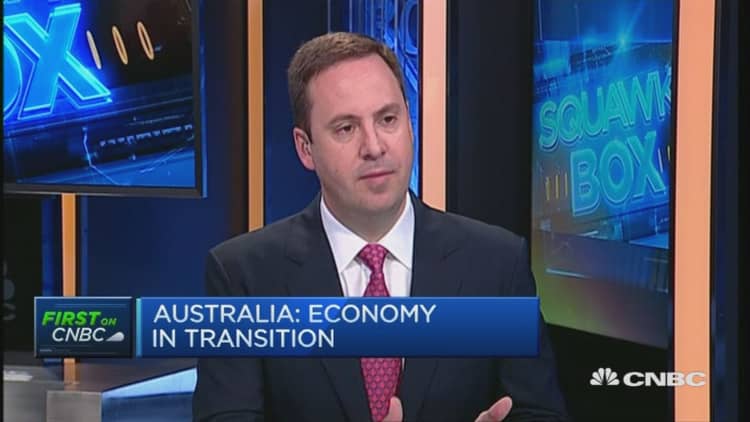


Australia's regulation on foreign investment has sparked debate as to how open the world's 12th largest economy really is, but the country's trade minister told CNBC on Thursday that the situation was being blown out of proportion.
Recent messages from Canberra suggest the government is increasingly taking a tough stance on foreign business interests controlling domestic assets such as farmland.
Treasurer Scott Morrison said in November that he would block the sale of Australia's largest cattle property portfolio, S. Kidman & Co, to overseas buyers. And the government announced in February that it would launch a register of foreign ownership of water rights, citing data that showed foreign ownership climbed by 55 percent from 2010 to 2013. Australia boasts an advanced water-trading system whereby landholders can sell water on their property.
But Australia's Minister for Trade and Investment, Steven Ciobo, largely dismissed worries about what some call the nation's "protectionist" policies.
"We've got to maintain perspective on this. Since 2001, there's only been three occasions that the Foreign Investment Review Board has said no to a foreign investor. On average, we get 1,000 applications a year," he told CNBC's "Asia Squawk Box."
"I'm not going to deny there are concerns ...But the actual framework for investment is governed by what we call a national interest test, i.e. it has to be in Australia's natural interest for this investment to happen. And the vast bulk are."
Residential property purchases by overseas citizens, particularly those from China, are especially a hot-button issue in Australia.
China surpassed the United States to become the largest source of foreign investment in Australia last year, with home purchases leading the way, according to the Foreign Investment Review Board.
That's sparked rising resentment among Aussie citizens, who've blamed foreigners for pushing property prices out of the reach of local workers. The national average capital city house price rose by 7.8 percent in 2015.
In a poll conducted by the Lowy Institute think tank last year, 70 percent of respondents said Australia allowed too much Chinese investment in residential real estate
However, there are signs indicating the recent bubble may be cooling. Data last week from property consultant CoreLogic RP Data showed annual home price growth across capital cities slowed to a 31 month-low in March.
On economic matters, Ciobo said the government remained committed to diversifying the economy away from resources and towards services and non-mining investments.
The global commodity boom, fueled by the mainland over the past decade, has long helped Australia's resource-rich economy but as that boom went to bust over the past year, it's forced Canberra to focus more on non-mining investment. Still, that hasn't decreased the nation's reliance on Beijing.
Ciobo will lead the country's "largest ever trade mission" to China next week in the hopes of discovering fresh commercial opportunities, he said.
Having recently inked the China-Australia free trade agreement (FTA), Ciobo will take a delegation of around 1,000 people to the week-long event, called Australia Week in China (AWIC), to capitalize on the recent FTA.
"Everyone knows the resource story is a core natural strength of Australia but with the drop-off in commodity prices, we've seen capital expenditure reduced over the past couple of years. What the government's focused on now is how we can continue the transition of the economy."
"Seventy-five percent of our economy is services-based, we want to make sure we expand on services exports so that's part of the reason why we have 1,000 delegates going to China."
He named agri-business as a potential sector that could soon lead Australian exports.
"We produce three times the amount of food than we consume in Australia, we can be a good exporter of agricultural products so there's a lot of interest and appetite for that."



